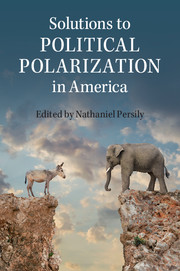Book contents
- Frontmatter
- Dedication
- Contents
- Contributors
- Introductory Chapters
- Reforming the Electoral System
- Strengthening Parties
- Empowering and Informing Moderate Voters
- Lowering Barriers to Policy Making
- 14 Beyond Confrontation and Gridlock: Making Democracy Work for the American People
- 15 American Political Parties: Exceptional No More
- 16 Partisan Polarization and the Senate Syndrome
- 17 Finding the Center: Empowering the Latent Majority
- 18 Making Deals in Congress
- 19 Helping Congress Negotiate
- 20 Staying Private
- Index
- References
19 - Helping Congress Negotiate
from Lowering Barriers to Policy Making
Published online by Cambridge University Press: 05 May 2015
- Frontmatter
- Dedication
- Contents
- Contributors
- Introductory Chapters
- Reforming the Electoral System
- Strengthening Parties
- Empowering and Informing Moderate Voters
- Lowering Barriers to Policy Making
- 14 Beyond Confrontation and Gridlock: Making Democracy Work for the American People
- 15 American Political Parties: Exceptional No More
- 16 Partisan Polarization and the Senate Syndrome
- 17 Finding the Center: Empowering the Latent Majority
- 18 Making Deals in Congress
- 19 Helping Congress Negotiate
- 20 Staying Private
- Index
- References
Summary
Several important underlying causes of our current polarization in Congress will persist for the foreseeable future. The framers bequeathed us a set of democratic institutions that separate powers more than in almost any other modern industrial democracy, generating veto powers by each of two houses of Congress and a president. We have added an electoral system, based on plurality votes in single-member districts, that gives great power to the individual legislator, making coordination even harder. We eschew systems of compulsory voting that would bring moderate voters into the elections. We pick our candidates through primary elections constructed and timed to bring out the most extreme portion of the electorate. Through the constitutional rulings of our highest court, we have deprived ourselves of the capacity to block out-of-district and out-of-state money aimed at small but close elections at the primary level. Changes to any of these features of the current constitutional system are politically hard to imagine. If we add to this long-standing constitutional and institutional system the current causes of polarization, including two parties that, since the Southern realignment, have become ideologically far more internally consistent and since 1980 have become far more competitive in their potential control of the presidency and Congress, we have a recipe for deadlock.
If polarization is the “new normal,” we must adopt institutions designed for enemies, not friends. Negotiation is such an institution. Negotiation does not require the parties to put aside their enmity to reach for common ground. To the contrary, even enemies can negotiate as long as both can benefit from a deal. In many cases one or both parties in Congress will benefit from stalemate rather than a deal, in which case negotiation is not the answer. But we know from 50 years of work in the field of negotiation in business and international relations that often parties will walk away from a deal that would benefit all sides because either they are not cool-headedly letting their interests dictate their actions or they are unskilled in looking for ways to “expand the pie” by exploiting differences in value between the parties. Or both.
- Type
- Chapter
- Information
- Solutions to Political Polarization in America , pp. 262 - 274Publisher: Cambridge University PressPrint publication year: 2015



